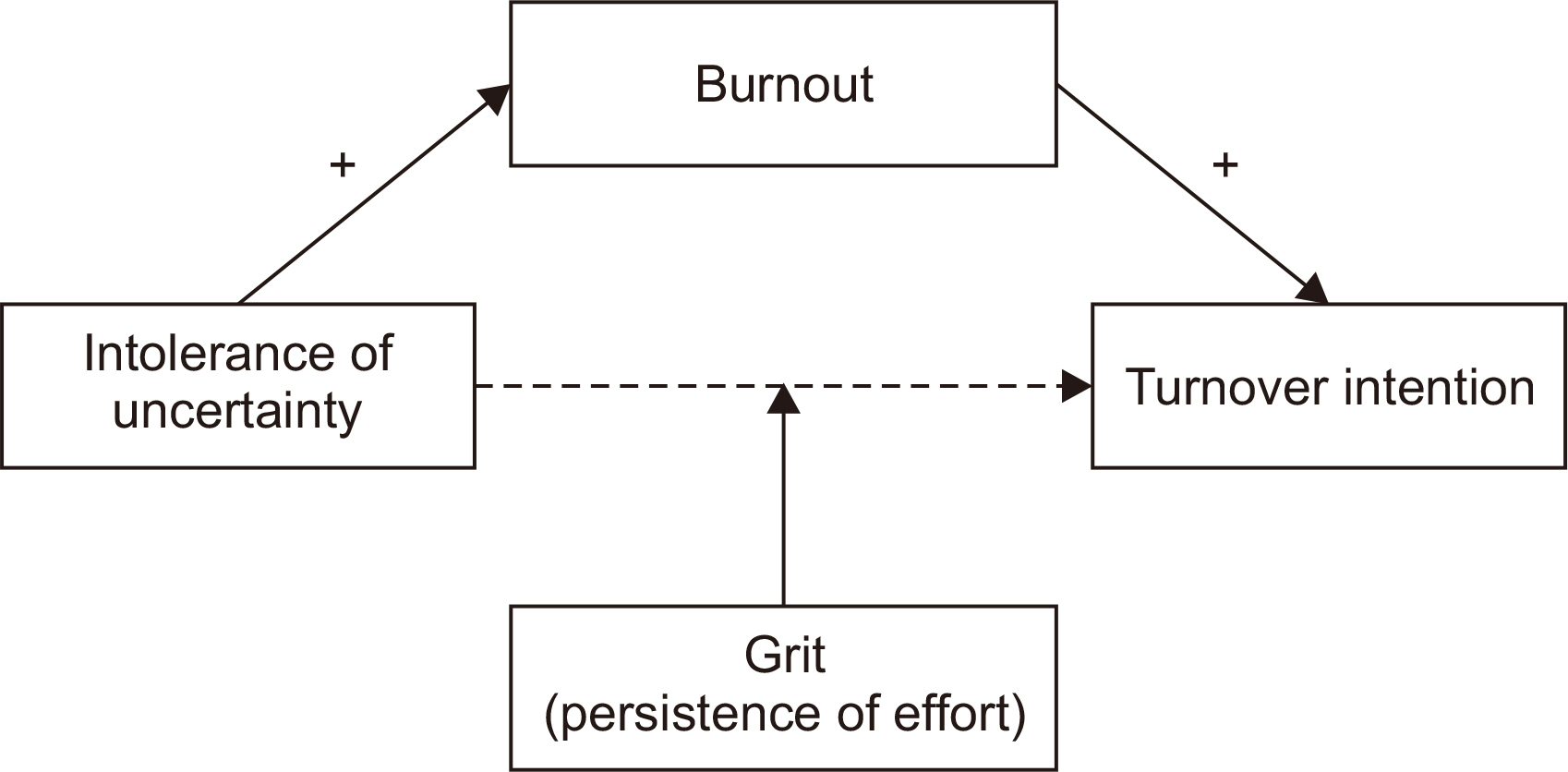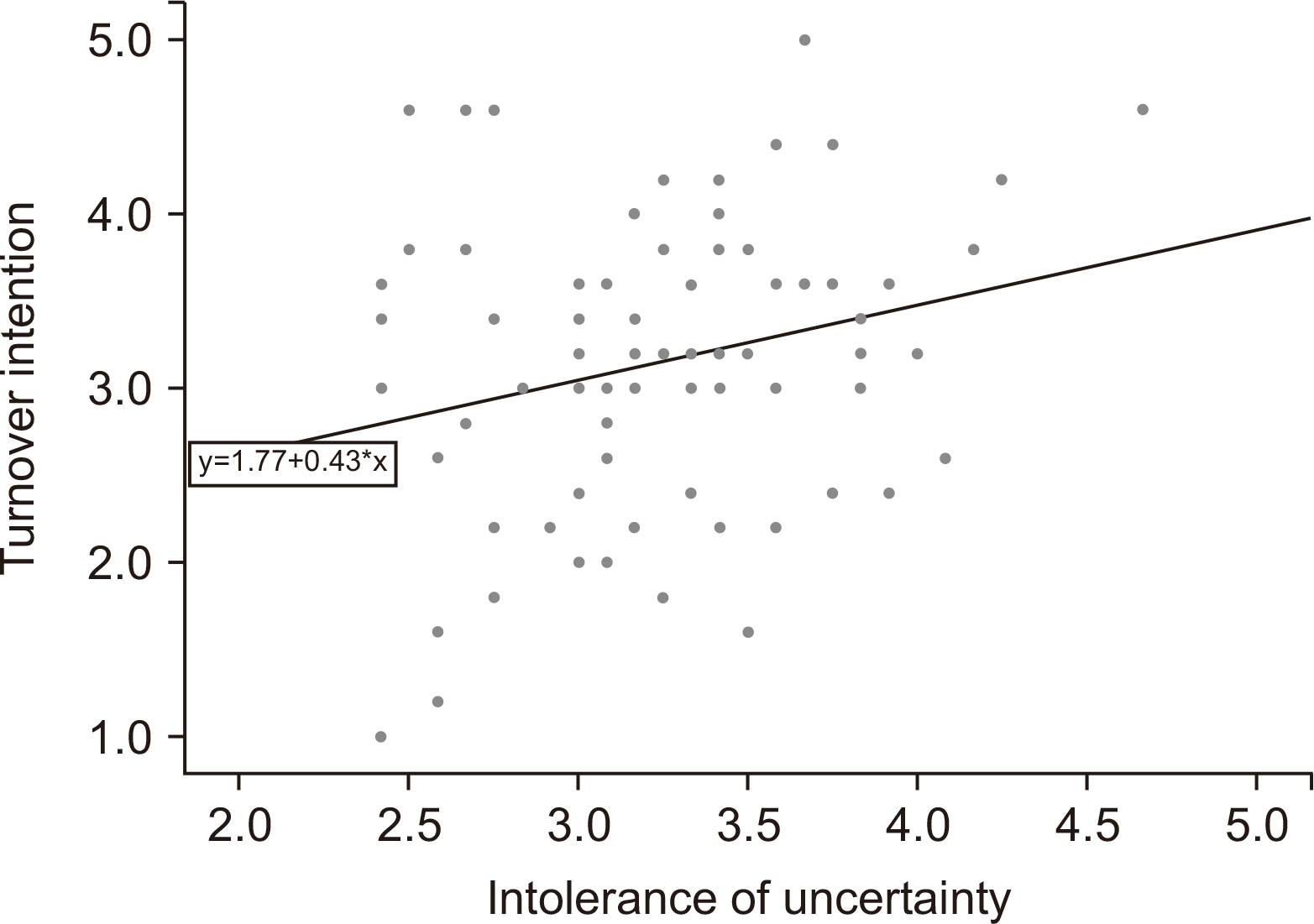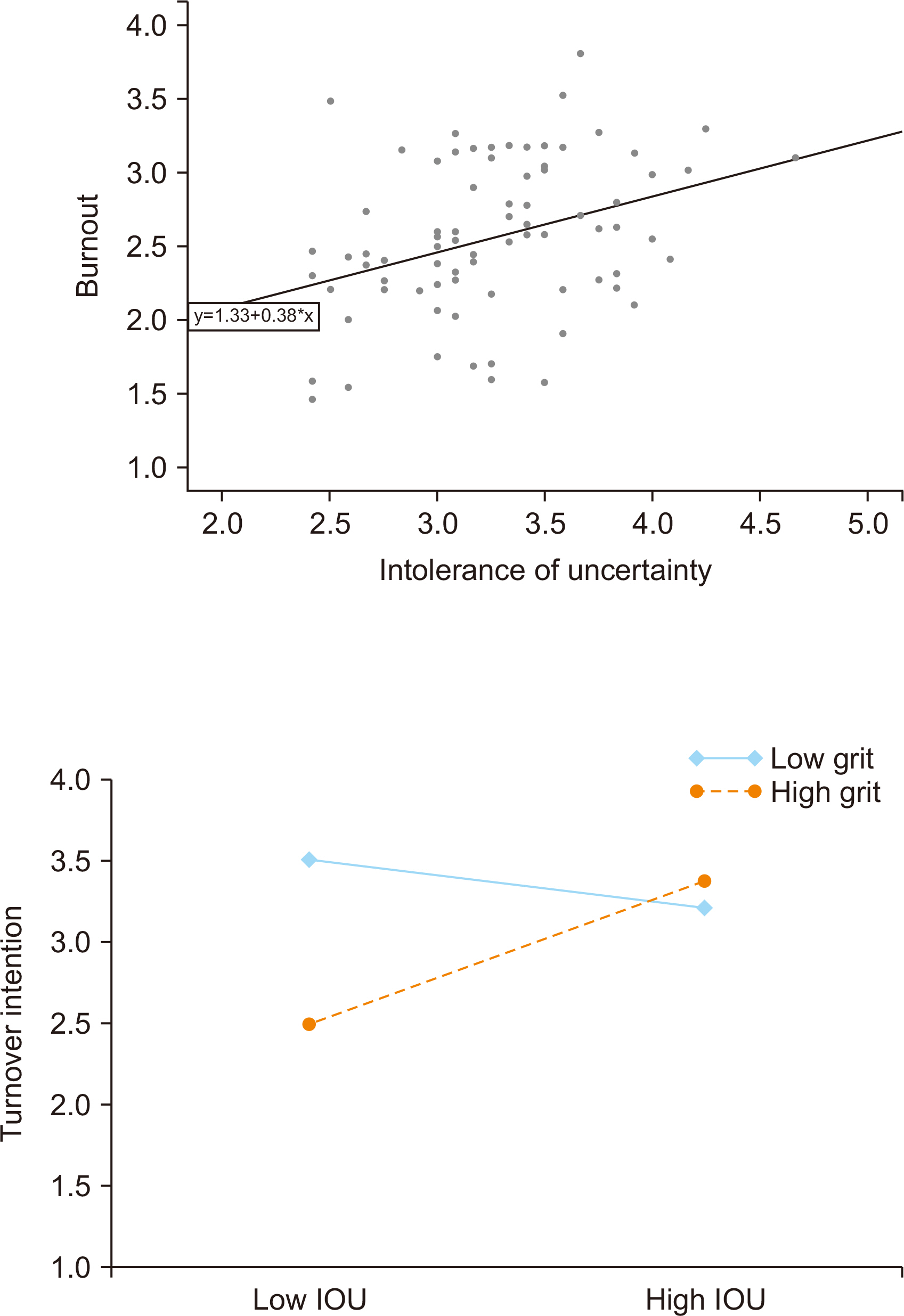Korean J Transplant.
2020 Dec;34(4):265-271. 10.4285/kjt.20.0044.
Effects of intolerance of uncertainty on turnover intention in transplantation coordinators: the roles of burnout and grit
- Affiliations
-
- 1Coaching Psychology, Graduate school of Education, Baekseok University, Seoul, Korea
- 2Organ Transplant Center, Severance Hospital, Yonsei University College of Medicine, Seoul, Korea
- 3Organ Transplant Center, The Catholic University of Korea Seoul ST. Mary’s Hospital, Seoul, Korea
- 4Department of Psychology, Kangwon National University, Chuncheon, Korea
- KMID: 2510265
- DOI: http://doi.org/10.4285/kjt.20.0044
Abstract
- Background
Transplantation coordinators are essential professionals who play a wide range of roles in organ transplantation. Their burnout levels have been shown to be very high due to the significant uncertainty they experience at work. The taxing conditions that accompany their position can increase turnover, which can, in turn, lead to a decrease in the number of experts working in the field. This calls for an improved understanding of their turnover intentions.
Methods
We collected data of 80 transplantation coordinators and measured their intol- erance of uncertainty, burnout, turnover intention, and grit. The data were analyzed using a multiple regression analysis.
Results
A mediation model was confirmed in which intolerance of uncertainty significantly increases burnout, which, in turn, increases turnover intention. The moderating effects of grit on the relationship between intolerance of uncertainty and turnover inten- tions were also found to be significant. When grit was low, overall turnover intention was high, regardless of intolerance of uncertainty. Conversely, when grit was high, the intention to leave was high only when the intolerance of uncertainty was also high.
Conclusions
There is a high level of uncertainty among transplantation coordinators due to the nature of the work; however, the degree to which the uncertainty is accepted varies individually. It is therefore necessary to seek ways to manage the uncertainty at an organizational and personal level. These efforts could contribute to improving transplan-tation coordinators’ long-term service and expertise.
Figure
Reference
-
1. Son HM, Koh MH, Kim CM, Yi MS. 2006; The experiences of transplantation coordinators' practice. J Korean Acad Nurs. 36:1012–22. DOI: 10.4040/jkan.2006.36.6.1012. PMID: 17091001.
Article2. Dugas MJ, Schwartz A, Francis K. 2004; Brief report: intolerance of uncertainty, worry, and depression. Cognit Ther Res. 28:835–42. DOI: 10.1007/s10608-004-0669-0.
Article3. Buhr K, Dugas MJ. 2002; The intolerance of uncertainty scale: psychometric properties of the English version. Behav Res Ther. 40:931–45. DOI: 10.1016/S0005-7967(01)00092-4. PMID: 12186356.
Article4. Dugas MJ, Kristin B, Robert L. Heimberg RG, Turk CL, Mennin DS, editors. 2004. The role of intolerance of uncertainty in etiology and maintenance. Generalized anxiety disorder: advances in research and practice. Guilford Press;New York, NY: p. 143–63.5. Kardum I, Krapić N. 2001; Personality traits, stressful life events, and coping styles in early adolescence. Pers Individ Dif. 30:503–15. DOI: 10.1016/S0191-8869(00)00041-6.
Article6. Lee KS, Yeon KJ. 2019; The relation between intolerance of uncertainty and career decision ambiguity tolerance among Korean college students: moderated mediation effect of worry and mentoring function. J Career Educ Res. 32:77–98. DOI: 10.32341/JCER.2019.03.32.1.77.7. Park JH, Jung SC. 2017; The influence of adaptability for uncertainty on turnover intention and the serial multiple mediating effect of role ambiguity and job satisfaction. Korean J Ind Organ Psychol. 30:177–94. DOI: 10.24230/kjiop.v30i2.177-194.
Article8. Griffeth RW, Hom PW, Gaertner S. 2000; A meta-analysis of antecedents and correlates of employee turnover: update, moderator tests, and research implications for the next millennium. J Manag. 26:463–88. DOI: 10.1177/014920630002600305.
Article9. Lee EK, Kim JS. 2020; Jan. 29. Nursing stress factors affecting turnover intention among hospital nurses. Int J Nurs Pract. [Epub]. https://doi.org/10.1111/ijn.12819. DOI: 10.1111/ijn.12819. PMID: 31997511.
Article10. Maslach C, Schaufeli WB, Leiter MP. 1986. Maslach burnout inventory manual. Consulting Psychologists Press;Mountain View, CA:11. Schaufeli WB, Buunk BP. Schabracq MJ, Winnubst JA, Cooper CL, editors. 2003. Burnout: an overview of 25 years of research and theorizing. Handbook of work and health psychology. Wiley;Hoboken, NJ: p. 383–425. DOI: 10.1002/0470013400.ch19.
Article12. Yoon MJ. 2019. The effect of emotional labor on job engagement of medical service personnel: the moderated mediation effect of psychological burnout and length of service [master's thesis]. Konyang University;Seoul, KR:13. Shin EM, Son YC. 2019; The effects of intolerance of uncertainty on burnout among counselor: the mediating effect of self-compassion and burnout. J Humanit Soc Sci. 10:1091–106. DOI: 10.22143/HSS21.10.6.80.14. Lee NH. 2011. A study on the relationship between burnout, job stress and self-efficacy in psychiatric nurses [master's thesis]. Ehwa Womans University;Seoul, KR:15. Labrague LJ, McEnroe-Petitte DM, Gloe D, Tsaras K, Arteche DL, Maldia F. 2017; Organizational politics, nurses' stress, burnout levels, turnover intention and job satisfaction. Int Nurs Rev. 64:109–16. DOI: 10.1111/inr.12347. PMID: 27995623.
Article16. Duckworth AL, Peterson C, Matthews MD, Kelly DR. 2007; Grit: perseverance and passion for long-term goals. J Pers Soc Psychol. 92:1087–101. DOI: 10.1037/0022-3514.92.6.1087. PMID: 17547490.
Article17. Lee SB, Bae EH, Shon YW, Lee SR. 2016; Grit as a buffer against negative feedback: the effect of grit on emotional responses to negative feedback. Korean J Soc Pers Psychol. 30:25–45. DOI: 10.21193/kjspp.2016.30.3.002.18. Carleton RN, Sharpe D, Asmundson GJ. 2007; Anxiety sensitivity and intolerance of uncertainty: requisites of the fundamental fears? Behav Res Ther. 45:2307–16. DOI: 10.1016/j.brat.2007.04.006. PMID: 17537402.19. Maslach C, Jackson SE. 1981; The measurement of experienced burnout. J Organ Behav. 2:99–113. DOI: 10.1002/job.4030020205.
Article20. Credé M, Tynan MC, Harms PD. 2017; Much ado about grit: a meta-analytic synthesis of the grit literature. J Pers Soc Psychol. 113:492–511. DOI: 10.1037/pspp0000102. PMID: 27845531.
Article21. Becker TE. 1992; Foci and bases of commitment: are they distinctions worth making? Acad Manage J. 35:232–44. DOI: 10.5465/256481.
Article22. Baron RM, Kenny DA. 1986; The moderator-mediator variable distinction in social psychological research: conceptual, strategic, and statistical considerations. J Pers Soc Psychol. 51:1173–82. DOI: 10.1037/0022-3514.51.6.1173. PMID: 3806354.
Article23. Hayes AF. 2013. Introduction to mediation, moderation, and conditional process analysis: a regression-based approach. Guilford Press;New York, NY:24. Bredemeier K, Berenbaum H. 2008; Intolerance of uncertainty and perceived threat. Behav Res Ther. 46:28–38. DOI: 10.1016/j.brat.2007.09.006. PMID: 17983612.
Article25. Eskreis-Winkler L, Shulman EP, Beal SA, Duckworth AL. 2014; The grit effect: predicting retention in the military, the workplace, school and marriage. Front Psychol. 5:36. DOI: 10.3389/fpsyg.2014.00036. PMID: 24550863. PMCID: PMC3910317.
Article26. Lee SJ, Park JY. 2018; The effects of grit and stress on nursing student's adjustment to college life. J Digit Converg. 16:269–76.27. Robertson-Kraft C, Duckworth AL. 2014; True grit: trait-level perseverance and passion for long-term goals predicts effectiveness and retention among novice teachers. Teach Coll Rec (1970). 116:PMID: 25364065. PMCID: PMC4211426.28. Duckworth A. 2016. Grit: the power of passion and perseverance. Scribner;New York, NY:29. Jung SJ. 2020. grit and job satisfaction- a mediation of goal-work congruence and moderation of socioeconomic status [master's thesis]. Yonsei University;Seoul, KR:
- Full Text Links
- Actions
-
Cited
- CITED
-
- Close
- Share
- Similar articles
-
- Effects of Job Crafting, Burnout, and Job Satisfaction on Nurses' Turnover Intention: A Path Analysis
- Relationships among Burnout, Job Satisfaction, Organizational Commitment and Turnover Intention to Resign in Hospital Nurses
- Influence of Occupational Stress and Burnout on Turnover Intention of Caregivers in Geriatric Hospitals
- The Relationship of Emotional Labor, Empowerment, Job Burnout and Turnover Intention of Clinical Nurses
- Mediating Effects of Burnout in the Association Between Emotional Labor and Turnover Intention in Korean Clinical Nurses




